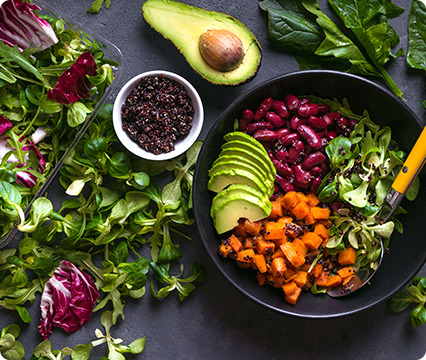The effects of vegetarian and vegan diets on gut microbiota
This 2019 review looks at the effects of various diets and nutrients, especially plant-based diets, on gut microbiota composition, and evaluates the consequences of the microbial metabolites on host health. Tomova et al. explain that plant-based diets appear to be beneficial to human health by promoting more diverse and stable microbial systems. Compared to omnivores (people that eat a variety of food of both plant and animal origin), vegans and vegetarians have significantly higher populations of Bacteroidetes-related colonies. Fibers found exclusively in plants increase lactic acid bacteria and reduce Clostridium and Enterococcus species, while polyphenols (also very commonly found in plant foods) increase bacterial species that have protective properties, as well as anti-pathogenic and anti-inflammatory effects. A fiber-rich diet also encourages the growth of bacteria that ferment fibers and produce short-chain fatty acids (SCFAs) as a result. These fatty acids have numerous positive impacts on health, including enhancing immunity against pathogens, increasing the integrity of the blood-brain barrier, and regulating critical functions of the intestine. To conclude, the available evidence suggests that a vegetarian or vegan diet can help people develop a diverse ecosystem of beneficial bacteria that promote human gut microbiome and overall health. [NPID: plant based, whole foods, vegan, vegetarian, gut microbiota, gut-brain health, microbial metabolites, omnivores, Bacteroidetes, fiber, Clostridium, Enterococcus, microbiome]
Year: 2019
 Navigation
Navigation






